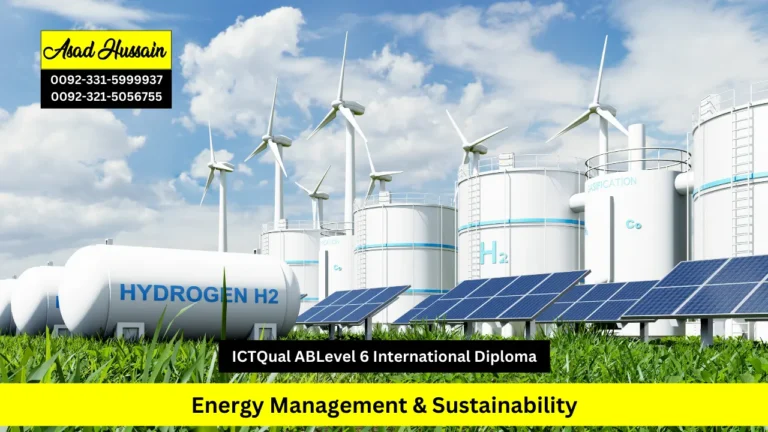In today’s global economy, efficient logistics and supply chain management are critical to the success of businesses across industries. The ICTQual AB Level 6 International Diploma in Logistics & Supply Chain Technology equips learners with advanced knowledge, practical skills, and professional competencies required to manage complex supply chains, optimize operations, and drive organizational efficiency. ICTQual AB Level 6 International Diploma in Logistics & Supply Chain Technology bridges theoretical understanding with hands-on applications, preparing graduates for leadership roles in logistics, procurement, warehousing, and supply chain management.
Designed for both fresh learners and experienced professionals, ICTQual ABLevel 6 International Diploma in Logistics & Supply Chain Technology spans 360 credits and covers topics including supply chain strategy, inventory management, transportation and distribution, procurement processes, warehouse technology, risk management, and emerging digital solutions. Learners gain practical experience through case studies, project-based assignments, and industry-relevant simulations, enabling them to apply best practices in real-world logistics and supply chain scenarios.
Upon completion, graduates will possess a deep understanding of logistics principles, supply chain operations, and technology-driven solutions. They will be capable of analyzing supply chain performance, implementing efficient processes, managing resources, and contributing to business competitiveness in a rapidly evolving market.
Whether you are starting your career in logistics or seeking to enhance your professional expertise, the ICTQual AB Level 6 International Diploma in Logistics & Supply Chain Technology offers a pathway to internationally recognized certification, practical skills, and strategic knowledge, preparing you to excel in global supply chain and logistics management.
Program Highlights
Study Units
Year 1 – Foundations of Logistics & Supply Chain
- Introduction to Logistics and Supply Chain Management
- Principles of Transport and Distribution
- Inventory Management and Control Systems
- Procurement and Supplier Management
- Basics of Warehouse Operations
- Supply Chain Economics and Policy
- Fundamentals of Risk Management in Logistics
- Business Communication and Professional Ethics
- Introduction to Global Trade and Regulations
- Sustainability and Environmental Management in Supply Chains
- Information Systems in Logistics
- Introduction to Project Management
Year 2 – Applied Logistics Operations & Management
- Advanced Supply Chain Planning and Scheduling
- Freight and Transportation Management
- Procurement Strategy and Supplier Evaluation
- Warehouse and Inventory Optimisation Techniques
- Logistics Technology and Digitalisation
- Safety, Compliance, and Risk Mitigation in Operations
- Logistics Performance Measurement and KPIs
- Lean and Six Sigma Applications in Supply Chains
- Global Logistics and International Trade Management
- Human Resource and Team Management in Logistics
- Applied Case Studies in Supply Chain Management
- Simulation Exercises in Logistics Operations
Year 3 – Strategic Leadership & Advanced Supply Chain Management
- Strategic Supply Chain Management
- Leadership and Decision-Making in Logistics
- Advanced Procurement and Contract Management
- Global Supply Chain Integration and Coordination
- Transport Network Design and Optimisation
- Risk Management and Crisis Response in Supply Chains
- Sustainability, Circular Economy, and Green Logistics
- Emerging Technologies and Innovation in Supply Chains
- Data Analysis and Research Methods for Logistics
- Independent Research Project in Logistics & Supply Chain
- Capstone Project: Applied Strategic Supply Chain Management
- Performance Audit and Continuous Improvement Strategies
The ICTQual AB Level 6 International Diploma in Logistics & Supply Chain Technology is designed to equip learners with advanced skills and knowledge in supply chain management, logistics operations, and business optimization. To ensure success in ICTQual AB Level 6 International Diploma in Logistics & Supply Chain Technology, candidates are required to meet the following entry requirements:
Age Requirements
- Applicants must be at least 18 years old at the time of registration.
Educational Requirements
- A Level 5 diploma or equivalent in logistics, supply chain management, business administration, or related fields.
- Candidates with A-levels, high school diploma, or vocational qualifications in business, management, or technical subjects may also be considered.
Professional Experience
- For experienced professionals, a minimum of 3–5 years of relevant work experience in logistics, supply chain operations, warehousing, or transportation management is preferred.
- Hands-on experience in inventory control, procurement, or distribution management is advantageous.
English Language Proficiency
- Proficiency in English is required for academic comprehension, report writing, and professional communication.
- Applicants must provide evidence of IELTS 5.5 or equivalent, or demonstrate prior education in English.
Meeting these entry requirements ensures learners are fully prepared to engage with course content, complete assessments successfully, and thrive in professional logistics and supply chain environments. Candidates satisfying these criteria are positioned for a rewarding career in global supply chain and logistics management.
The ICTQual AB Level 6 International Diploma in Logistics & Supply Chain Technology equips learners with advanced knowledge, practical skills, and strategic competencies required to excel in logistics, supply chain management, and global trade operations. The ICTQual AB Level 6 International Diploma in Logistics & Supply Chain Technology emphasizes theoretical understanding, practical application, and leadership development, ensuring graduates can contribute effectively to modern supply chain environments.
Year 1 – Foundations oLogistics & Supply Chain
Introduction to Logistics and Supply Chain Management
- Explain fundamental concepts, principles, and functions of logistics and supply chains.
- Analyze the role of supply chain management in business operations.
- Apply theoretical knowledge to basic logistics scenarios.
Principles of Transport and Distribution
- Understand transport modes, distribution channels, and their operational significance.
- Assess transport efficiency and cost-effectiveness.
- Apply planning techniques to optimize distribution processes.
Inventory Management and Control Systems
- Demonstrate inventory planning, control, and replenishment strategies.
- Utilize software and manual systems to track stock levels accurately.
- Evaluate inventory performance using measurable metrics.
Procurement and Supplier Management
- Explain procurement processes and supplier relationship management principles.
- Evaluate supplier performance and compliance with contractual obligations.
- Apply sourcing strategies to ensure quality, cost, and delivery efficiency.
Basics of Warehouse Operations
- Describe warehouse layouts, storage systems, and operational workflows.
- Apply best practices in material handling and stock organization.
- Implement safety and efficiency protocols in warehouse management.
Supply Chain Economics and Policy
- Analyze economic factors affecting supply chain operations.
- Understand policy frameworks and regulations influencing logistics activities.
- Apply economic principles to decision-making in logistics scenarios.
Fundamentals of Risk Management in Logistics
- Identify potential risks in supply chain operations.
- Apply risk assessment and mitigation techniques.
- Evaluate contingency planning effectiveness in logistics environments.
Business Communication and Professional Ethics
- Demonstrate professional communication in reports, presentations, and meetings.
- Apply ethical principles in supply chain decision-making.
- Develop interpersonal and teamwork skills for logistics environments.
Introduction to Global Trade and Regulations
- Understand international trade processes, tariffs, and regulations.
- Assess compliance requirements in cross-border logistics.
- Apply knowledge to manage import/export documentation and procedures.
Sustainability and Environmental Management in Supply Chains
- Explain the principles of sustainable logistics and environmental responsibility.
- Evaluate environmental impact and implement green supply chain practices.
- Apply sustainability frameworks to operational decision-making.
Information Systems in Logistics
- Utilize logistics information systems and technologies.
- Analyze data to support operational decisions.
- Implement software tools for inventory, transport, and procurement management.
Introduction to Project Management
- Explain project management principles, methodologies, and tools.
- Plan, execute, and monitor basic logistics-related projects.
- Apply project management techniques to achieve measurable objectives.
Year 2 – Applied Logistics Operations & Management
Advanced Supply Chain Planning and Scheduling
- Develop supply chain plans aligned with organizational objectives.
- Apply scheduling techniques to optimize resource allocation.
- Analyze supply chain performance using measurable KPIs.
Freight and Transportation Management
- Manage freight operations efficiently, considering cost, time, and quality.
- Evaluate transport options and select optimal routes.
- Apply real-world solutions to complex transportation challenges.
Procurement Strategy and Supplier Evaluation
- Design strategic procurement plans and supplier selection criteria.
- Evaluate supplier performance against key metrics.
- Implement sourcing strategies to enhance operational efficiency.
Warehouse and Inventory Optimisation Techniques
- Apply advanced techniques to optimize warehouse layout and inventory flow.
- Utilize software and tools for real-time inventory management.
- Evaluate warehouse performance and implement process improvements.
Logistics Technology and Digitalisation
- Integrate digital technologies into supply chain operations.
- Apply automated systems, IoT, and software tools to logistics processes.
- Evaluate technology adoption for operational effectiveness.
Safety, Compliance, and Risk Mitigation in Operations
- Implement safety protocols and regulatory compliance measures.
- Conduct risk assessments and apply mitigation strategies.
- Monitor and review compliance in operational processes.
Logistics Performance Measurement and KPIs
- Define and apply key performance indicators for supply chain operations.
- Analyze performance data to identify improvement areas.
- Implement continuous improvement strategies using measurable outcomes.
Lean and Six Sigma Applications in Supply Chains
- Apply Lean and Six Sigma principles to reduce waste and improve efficiency.
- Conduct process analysis and optimization in logistics operations.
- Measure improvement outcomes using statistical and operational metrics.
Global Logistics and International Trade Management
- Manage international supply chain networks and trade operations.
- Evaluate global logistics risks and regulatory requirements.
- Apply knowledge to optimize cross-border operations.
Human Resource and Team Management in Logistics
- Demonstrate leadership and team management skills in logistics operations.
- Apply conflict resolution, communication, and motivational strategies.
- Evaluate team performance and enhance operational efficiency.
Applied Case Studies in Supply Chain Management
- Analyze real-world logistics and supply chain scenarios.
- Apply theoretical knowledge to solve operational challenges.
- Evaluate outcomes and propose evidence-based solutions.
Simulation Exercises in Logistics Operations
- Engage in simulation-based learning to replicate logistics processes.
- Apply problem-solving skills in dynamic operational scenarios.
- Assess decision-making effectiveness using measurable criteria.
Year 3 – Strategic Leadership & Advanced Supply Chain Management
Strategic Supply Chain Management
- Develop strategic supply chain plans aligned with business objectives.
- Apply advanced planning tools for operational efficiency.
- Evaluate strategic performance using KPIs and measurable standards.
Leadership and Decision-Making in Logistics
- Demonstrate leadership in complex logistics and supply chain environments.
- Apply decision-making frameworks to solve operational and strategic challenges.
- Evaluate outcomes and refine decision-making processes.
Advanced Procurement and Contract Management
- Design advanced procurement strategies and contract management practices.
- Evaluate supplier agreements and performance metrics.
- Implement procurement best practices to ensure value and compliance.
Global Supply Chain Integration and Coordination
- Integrate supply chain processes across international networks.
- Coordinate logistics activities to optimize efficiency and cost.
- Apply tools and systems for seamless supply chain integration.
Transport Network Design and Optimisation
- Design and optimize transportation networks for efficiency and sustainability.
- Apply routing and scheduling techniques using analytical tools.
- Evaluate network performance and implement improvements.
Risk Management and Crisis Response in Supply Chains
- Develop risk mitigation strategies and crisis management plans.
- Analyze potential disruptions and implement contingency measures.
- Assess the effectiveness of risk management frameworks.
Sustainability, Circular Economy, and Green Logistics
- Apply sustainable practices in supply chain operations.
- Implement circular economy principles to reduce waste and enhance resource efficiency.
- Evaluate environmental impact and propose green logistics solutions.
Emerging Technologies and Innovation in Supply Chains
- Analyze technological innovations such as AI, IoT, and blockchain in supply chains.
- Apply emerging technologies to optimize operations and enhance competitiveness.
- Evaluate the impact of innovation on supply chain efficiency.
Data Analysis and Research Methods for Logistics
- Apply quantitative and qualitative research methods in logistics contexts.
- Analyze supply chain data to support decision-making.
- Present research findings in a professional and measurable format.
Independent Research Project in Logistics & Supply Chain
- Conduct independent research on relevant supply chain topics.
- Apply analytical and problem-solving skills to research projects.
- Present findings using professional documentation and evaluation criteria.
Capstone Project: Applied Strategic Supply Chain Management
- Plan and execute a comprehensive strategic supply chain project.
- Integrate knowledge from all units to address real-world challenges.
- Evaluate project outcomes using measurable performance indicators.
Performance Audit and Continuous Improvement Strategies
- Conduct performance audits of logistics and supply chain operations.
- Identify areas for improvement and develop actionable strategies.
- Apply continuous improvement frameworks to enhance operational efficiency.
Upon completion, learners will possess advanced knowledge, practical skills, and professional competencies to manage, optimize, and innovate in logistics and supply chain environments globally. Graduates are prepared for leadership roles, operational management positions, and strategic decision-making in logistics, supply chain, and related industries.
The ICTQual AB Level 6 International Diploma in Logistics & Supply Chain Technology is designed for learners who are motivated to develop advanced knowledge, practical skills, and professional competencies in logistics, supply chain management, and global trade operations. ICTQual AB Level 6 International Diploma in Logistics & Supply Chain Technology is suitable for both fresh learners and experienced professionals seeking to advance their careers.
1. Educational and Professional Background
- Learners with prior education in logistics, supply chain management, business administration, or related fields.
- Professionals working in operations, procurement, transportation, or warehouse management seeking career advancement.
2. Analytical and Problem-Solving Skills
- Individuals who enjoy analyzing complex supply chain challenges.
- Learners capable of applying strategic thinking to operational decision-making.
3. Technology-Savvy Learners
- Comfortable using logistics software, data analysis tools, and digital supply chain platforms.
- Interested in leveraging technology to optimize operations and efficiency.
4. Leadership and Teamwork
- Learners capable of collaborating effectively in team projects and workplace environments.
- Individuals aspiring to lead operational teams or supply chain projects.
5. Ethical and Professional Mindset
- Committed to professional ethics, compliance, and sustainability practices in logistics operations.
- Motivated to maintain high standards in decision-making and business conduct.
6. Career-Oriented and Goal-Driven
- Learners focused on advancing in global logistics, supply chain management, or operational leadership roles.
- Individuals aiming to enhance employability and professional recognition internationally.
ICTQual AB Level 6 International Diploma in Logistics & Supply Chain Technology is ideal for learners seeking to combine strategic knowledge, practical skills, and professional expertise, preparing them to excel in logistics, supply chain management, and operational leadership roles in a global context.







